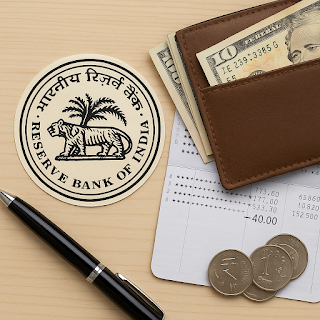RBI Rule: Can Your Account Go Into Minus for Not Maintaining Minimum Balance? Know What RBI Says
Nowadays, almost every person in the country holds at least one bank account. These accounts are essential for saving money, receiving salaries, pensions, and accessing various government schemes. But have you ever wondered what the rules are regarding the minimum balance that needs to be maintained in these accounts? And more importantly — can your account go into minus if you fail to maintain that balance?
These questions often create confusion among account holders. In this article, let's explore in detail what rules the Reserve Bank of India (RBI) has issued on this matter and what every customer should know.
What is Minimum Balance?
Minimum balance refers to the minimum amount of money that must be maintained in a bank account, as per the bank’s policy. This amount varies depending on the bank and the type of account (such as savings or current account). For example:
-
In metropolitan areas, the requirement could be ₹5,000,
-
In semi-urban areas, ₹2,000,
-
And in rural areas, ₹1,000 or even less.
If the account holder fails to maintain this minimum balance, the bank may charge a penalty fee.
What is Minus Balance?
A minus balance (or negative balance) occurs when the balance in your bank account becomes less than zero, usually due to charges applied by the bank even when there are insufficient funds.
For instance, if your account has ₹10 and the bank deducts a ₹50 penalty, your balance becomes -₹40.
But is this practice allowed? Let’s understand what the RBI rules say about it.
RBI’s Rule: Banks Cannot Take Your Account Into Negative Balance
The Reserve Bank of India clearly states that no bank is allowed to take a savings account into negative balance due to non-maintenance of minimum balance. The bank can reduce the balance to zero, but cannot go below that under any circumstances.
This rule applies specifically to savings accounts, which are the most common type of account among the public.
Banks Must Inform Account Holders First
According to RBI guidelines, if a customer is not maintaining the required minimum balance and the bank intends to levy charges, it must:
-
Inform the customer in advance,
-
Clearly state the reason and amount of the charge,
-
Give the customer reasonable time to maintain the balance.
Without this, banks cannot directly deduct charges or take the account into a negative balance.
Are Banks Allowed to Charge at the Time of Account Closure?
Many people believe that they must pay penalties or maintain a minimum balance before closing their account. But this is not true.
RBI clearly states that banks cannot demand any charges at the time of account closure. Even if the balance is lower than the minimum required, banks cannot make the account negative during closure.
If a customer wants to convert their regular savings account to a Basic Savings Bank Deposit Account (BSBDA), the bank must get the customer’s consent, and no charges should be imposed for this.
Banks Can Limit Services, Not Make Account Negative
Although the RBI prohibits banks from putting accounts into a negative balance, banks are allowed to restrict certain services if minimum balance is not maintained, such as:
-
Temporarily disabling ATM/debit card usage,
-
Not issuing new cheque books,
-
Suspending mobile or net banking services.
These steps can be taken to ensure compliance, but deducting beyond available balance is against RBI rules.
When RBI Penalized a Bank
Not long ago, a major bank was found violating RBI rules by deducting charges from accounts with insufficient balance and pushing them into negative territory. On discovering this, RBI imposed a penalty of over ₹90 lakh on the bank.
This incident proves that the RBI takes strict action against banks that breach customer protection guidelines.
Helpful Tips for Customers
-
Read Account Terms Carefully: Understand the rules related to minimum balance before opening or operating a bank account.
-
Pay Attention to Bank Messages: Do not ignore SMS or email notifications from your bank; they often contain important information about charges and balance requirements.
-
Opt for a Basic Account if Needed: If you’re unable to maintain a regular minimum balance, ask your bank to convert your account to a BSBDA, which has no minimum balance requirement.
-
Don’t Hesitate to File a Complaint: If your account has been taken into negative without proper notice, you can lodge a complaint with the RBI Banking Ombudsman.
Conclusion: Know Your Rights, Stay Informed
Banking services are expanding rapidly in India, and with them comes the need for greater awareness about customer rights. One such right is that your account cannot be pushed into negative balance simply for not maintaining the minimum balance.
The RBI has issued clear instructions to protect customers from unjust practices. Banks are expected to follow these rules strictly.
So, stay informed, monitor your bank account regularly, and take action if you feel your rights are being violated.




Comments
Post a Comment